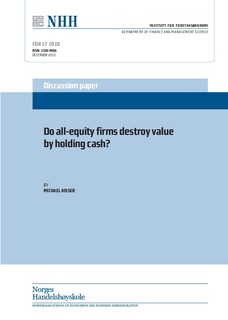Do all-equity firms destroy value by holding cash?
Working paper
Permanent lenke
http://hdl.handle.net/11250/164005Utgivelsesdato
2010-12Metadata
Vis full innførselSamlinger
- Discussion papers (FOR) [566]
Sammendrag
Empirical evidence shows that as of 2006, nearly every fifth large U.S. public corporation
was all-equity financed and that the corresponding average cash holding were nearly twice as
high as of the average U.S. firm. This paper therefore presents a simple real-options model to
characterize the value of cash for all-equity financed firms and analyze its impact on a firm's
investment decision. The model shows that precautionary saving may lead to a delay in investment policy compared to the benchmark of full external financing. This is because saving is
an option to invest at a lower price in the future and this option has an additional time value, thereby delaying optimal investment. In the context of growth options and external financing
frictions cash has extra value but this value is mostly negatively related to volatility. Testing
empirically whether all-equity firms destroy value by holding that much cash, I show that on average the market values cash approximately at par. Moreover, cash is rather valued at a premium if the presence of growth opportunities is being controlled for.
Utgiver
Norwegian School of Economics and Business Administration. Department of Finance and Management ScienceSerie
Discussion paper2010:17
